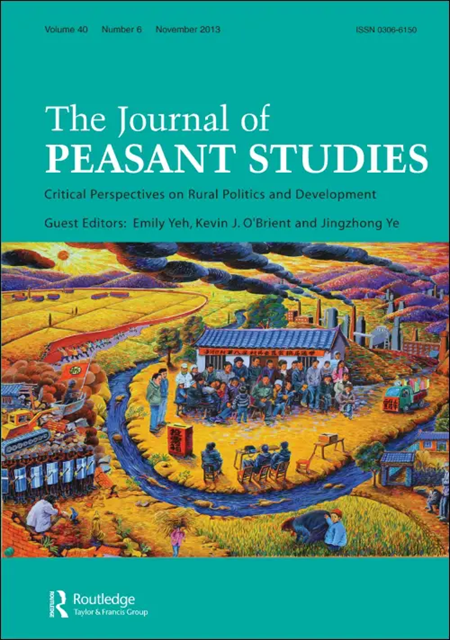阿根廷的领土重组和抵抗
IF 4.8
1区 社会学
Q1 ANTHROPOLOGY
引用次数: 58
摘要
本文认为,领土逻辑对于理解拉丁美洲资本积累和抵抗的过程尤为重要。该分析侧重于阿根廷,但从区域角度借鉴了整个拉丁美洲的例子,从胡胡伊省、科尔多瓦省和圣地亚哥德尔埃斯特罗省的地方角度借鉴了国家观点。第一节描述了意义、物理“地方”和政治法律“空间”的领土重组,因为它在多个尺度上发挥作用,以促进自然资源商品的投资、销售和出口。我认为,土地掠夺促进了这一过程,但不是唯一的责任。第二节探讨抵抗的领土逻辑。在可以理解为自下而上的领土重组中,农村社区正在寻找自己的方式来重组地方、法律空间和抵抗的意义,从农民争取土地改革的斗争到农民-土著联盟捍卫领土。这个新兴的联盟不仅对理解当今对土地掠夺和土地冲突的反应的本质很重要。认识和把握农民和土著集体行动历史之间的差异,对于在区域、国家和次国家层面维持这种联盟也至关重要。本文章由计算机程序翻译,如有差异,请以英文原文为准。
Territorial restructuring and resistance in Argentina
This article argues that the logic of territory is particularly important for understanding the processes of capital accumulation and resistance in Latin America. The analysis focuses on Argentina, but draws on examples from throughout Latin America for a regional perspective and from the provinces of Jujuy, Cordoba and Santiago del Estero for subnational views. Section one describes the territorial restructuring of meaning, physical ‘places’ and politico-legal ‘spaces', as it plays out at multiple scales to facilitate the investment in and sale and export of natural resource commodities. I argue that land grabs contribute to this process but are not solely responsible for it. Section two explores the territorial logic of resistance. In what might be understood as territorial restructuring from below, rural communities are finding their own ways of restructuring places, legal spaces and the meaning of resistance from a peasant struggle for land reform to a peasant–indigenous alliance in defense of territory. This emerging alliance is not only important for understanding the nature of reactions to land grabbing and land conflict today. Recognizing and navigating the differences between peasant and indigenous histories of collective action are also crucial for sustaining such alliances at the regional, national and subnational level.
求助全文
通过发布文献求助,成功后即可免费获取论文全文。
去求助
来源期刊

Journal of Peasant Studies
Multiple-
CiteScore
10.50
自引率
17.60%
发文量
99
期刊介绍:
A leading journal in the field of rural politics and development, The Journal of Peasant Studies (JPS) provokes and promotes critical thinking about social structures, institutions, actors and processes of change in and in relation to the rural world. It fosters inquiry into how agrarian power relations between classes and other social groups are created, understood, contested and transformed. JPS pays special attention to questions of ‘agency’ of marginalized groups in agrarian societies, particularly their autonomy and capacity to interpret – and change – their conditions.
 求助内容:
求助内容: 应助结果提醒方式:
应助结果提醒方式:


